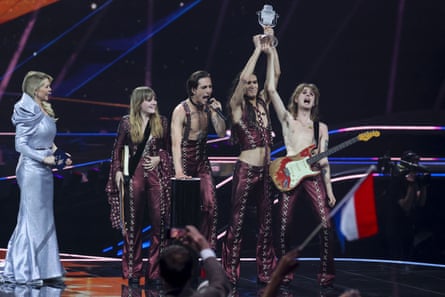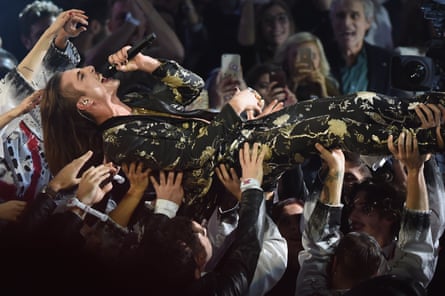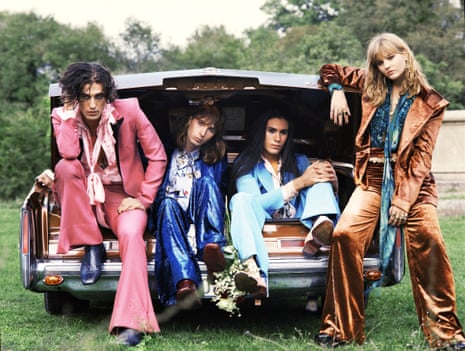Before their momentous Eurovision victory with Zitti e Buoni, placing Italian rock back on the world stage and earning praise from Simon Le Bon and Miley Cyrus; before a baseless accusation of snorting cocaine almost veered into a full-blown diplomatic crisis; and before their post-win ping-pong tournament became a twee secondary narrative, the Italian band Måneskin had already raised eyebrows in Rotterdam, this year’s host city.
After a rehearsal session ended late, says the bassist, Victoria De Angelis, they were parched – but realised there was no drinking water in their hotel rooms. “We went to the hotel reception, but they said there was no water around,” De Angelis says. “So we made it into the kitchen and took some.”
Cameras caught them and the following morning the hotel contacted Måneskin’s management, claiming that the artists had stolen some water and needed to pay for it. “And, of course, we did that!” says De Angelis.
“Yeah, we behaved well!” interjects the guitarist, Thomas Raggi. The band members can barely keep a straight face while telling this anecdote – more reminiscent of a summer-school-abroad adventure than a song contest that reached 183 million people.
While they admit their guilt in the late-night hydration bust, they are vexed by the unproven coke-snorting allegations, which were voiced after cameras picked up Damiano David, the frontman, leaning over a table. David, who said he had been clearing up a smashed glass, later took a drug test, which came back negative. “I think that, if someone is not particularly good, there’s no reason to criticise them,” he says. “So I saw this whole thing as: ‘Oh, Måneskin is too good, we have to say he’s snorting.’ I know it’s not great to be so self-congratulatory, but, truth is, we performed very well and there was something they needed to discredit us.”
“Damiano barely drinks beer,” adds De Angelis.
“Yeah, he’s such a sfigato, a dork: he goes to bed at 11pm with his chamomile tea,” says Raggi.

Måneskin – Danish for moonlight, inspired by De Angelis’s half-Danish heritage – were established in 2015 and had a stint as buskers on the streets of Rome. They came second in the 2017 series of X Factor Italia, their swaggering rock’n’roll rather overshadowing that year’s winner. After their debut album, Il Ballo della Vita (The Dance of Life), went triple platinum in Italy, they won the 2021 edition of the Sanremo music festival, whose winner becomes the country’s Eurovision entrant.
During our conversation, they freely talk over, complete and remark on each other’s answers like Seinfeld characters, alternating between lighthearted mockery and earnest contemplation, all with artistic curiosity and refreshing candour. While they acknowledge how important Eurovision can be for musicians who do not sing in English, they say they did not grow up as fans of the contest.
“We’ve never been the biggest cult followers,” says David, explaining that, for people their age – they were all born between 1999 and 2001 – Eurovision does not have the resonance it has with older generations. After Toto Cutugno’s victory in 1990, its relevance waned in Italy to the point that, between 1998 and 2010, the country did not participate.
“What we’ve always tried to do is never set any preconceived expectations and notions upon ourselves; one could say that neither X Factor nor Sanremo is the right context for a rock band, but we avoid such a rigid mindset. Living in Italy, it’s hard to get a global audience, but, once you get the right opportunity, then the music is the one doing the talking.”
Their second album, 2021’s Teatro D’Ira: Vol 1, cemented their reputation as solid live entertainers and added a tinge of auteur ambition. The band evoke 70s rock with a dash of turn-of-the-millennium nostalgia, straddling a continuum between Led Zeppelin, Red Hot Chili Peppers and Arctic Monkeys in exquisitely tailored trousers. They recorded the album live, and in a secluded rural studio, like so many rock greats before them. “After our first album, when we were really young, we had a moment when we stopped and said: what type of band do we want to be?” David says. This soul-searching lasted for two years.
“The work does show more artistic maturity,” says Raggi, who says they stopped focusing on David’s soulful vocals and created a sense of a whole band playing: “Our artistic vision is coming into more and more sharp focus.” The drummer, Ethan Torchio, seconds Raggi, with a hint of nerdiness. “There has been an in-depth technical study of our instruments – our quality jump is due to the fact that we worked very hard towards the same goal.”
The group credits the success of Zitti e Buoni to a combination of Italian language and a mainstream sound that was easy for anglophone listeners to acclimatise to. “Zitti e Buoni is a really old song of ours,” says David. “It’s one of our first tracks in Italian and it used to be completely different – it was an acoustic ballad with just voice and guitar, but we couldn’t come up with a convincing chorus.” Then, after a few years, they revived it, thanks to a riff Raggi composed. “Pssssh! Magic happened,” says David.
The English-language anthem I Wanna Be Your Slave – which, like Zitti e Buoni, is in the UK Top 30 – was a slow-burner, too. “Damiano once sent an audio note to our group chat where he said: ‘Hey, check out this banger I came up with on the piano.’ I was hanging out with Thomas, and we said: that sounds like shit,” says De Angelis.
It took a work trip to London, during which they transferred it to the bass and applied distortion, for it to click. “My audio note was indeed bad,” David says. “But my bandmates, as artists, should have had a minimum of imagination.”
The power ballad Vent’Anni (20 Years), which starts with the disclaimer: “I am only 20, so don’t be surprised if I have a tendency for drama,” is a meditation on being true to yourself and your legacy. “Vent’Anni is another side of us: we’re young, we talk about our lived experience. There’s rage, anger, aggression, but there’s more reflective and intimate parts,” says David.
Coraline – my personal favourite – combines their signature rock with the poetic imagery of the Italian singer-songwriter tradition, a tribute to the Italian cantautori. What starts off as a description of a girl with hair “like red roses” and “copper wires” is a study of a character who is still a child but, ultimately, carries the world on her shoulders. “She wants the sea, but is afraid of water, but maybe the sea is inside of her / Each word is an axe, a cut on her back.”
Måneskin’s success has been framed as an oddity – in Italy and at Eurovision – because they are a rock band, rather than a pop act. Are talent shows not the realm of stiff, songbird-like performers? And is Eurovision not the arena of Abba-like bubblegum high-camp?
True, the only rock group to win Eurovision previously was the Finnish orc-cosplay band Lordi, in 2006, with the magnificent spectacle of Hard Rock Hallelujah. But rock entries have been a Eurovision staple since 1956, when Freddy Quinn presented the rock’n’roll song So Geht Das Jede Nacht. By wearing metallic-leather glam-rock-inspired unitards with slight fetish elements, designed by Etro, and by using a set that cast imposing shadows on the backdrop, Måneskin delighted audiences with a performance that was energetic and elegant, demonstrating that not every Eurovision entry needs to be camp to be memorable.

Plus, while English audiences are mostly unaware, there is an Italian rock tradition, from the band Premiata Forneria Marconi in the 70s to artists who have enjoyed steady mainstream success since the 80s, such as Vasco Rossi and Gianna Nannini.
In 1979, the prog-rocker turned singer-songwriter Ivano Fossati, who penned some of the most artistically refined songs for Italian divas (do yourself a favour and listen to Danza), released La Mia Banda Suona Il Rock. It is a rock song that has had a huge critical, commercial and cultural impact in Italy (and makes for a great drunken karaoke number). The lyrics praise music, specifically rock, as the conduit of universal communication: “It seeps into walls, it breaches doors and, in the end, it tells you that your soul is not dead.” Måneskin are in line with this ethos, straddling the line between reality and escapism. “Music is a way for us to express a full range of emotions,” says Raggi. “The stage is like your magic box, where you can do anything you want, because you’re 100% free, and you can express yourself for what you actually are.”
Måneskin acknowledge that their foundations lie in English-language acts, such as the aforementioned Chili Peppers and Led Zeppelin, plus REM and, in the case of Torchio, “a lot of prog rock”. Nonetheless, De Angelis highlights 80s and 90s Italian rock bands, such as Marlene Kuntz, whose songs combine noise rock and the Italian singer-songwriter tradition; Verdena, who draw from grunge; and the alt-rock band Afterhours. “Sure, the pop-indie-trap dominance in Italy is undeniable, but then along came Måneskin,” says De Angelis. “There’s a new dominance now!” David says.
They have already sold out most dates in Italian concert halls for their 2021-22 tour and are booking appearances at major European festivals, such as Rock am Ring in Germany. Rolling Stone Italia has remarked that, when singing in Italian, they risk being big fish in a small pond, while, in English, they risk being goldfish in the ocean. Nevertheless, they are clearly adapting to the new ecosystem.
